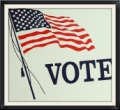Chef Bob's Bytes
From Campfires to Card Systems
Bob Huber has been involved with food operations since he started his first grocery store in his basement at age 5. He learned the basic from his parents and cooked pies in the wilderness using a home-built convention oven as the Senior Patrol Leader in the Boy Scouts.
His institutional cooking experience began with helping with large church dinners. During high school he learned how to quickly feed 200 very hungry boy scout leaders (Order of the Arrow) who spent several winter weekends a year cutting down trees, replacing latrines, and building bridges and boat houses at Rodney Scout Reservation on the Chesapeake Bay.
After college he worked at three hotels in New England as an internal hotel auditor and became intimately acquainted with the large first generation POS systems.
However, his high volume food service experience quickly took shape in 1985 when he was hired by a young Burger King restaurant company (Nicholas Janikies & Richard Weinand) with only five but very busy units in Rhode Island and Massachusetts. In less than eight years, the company grew to over 50 restaurants in five states.
Bob's entrepreneurial skills kept pace with the restaurant owners as he became progressively responsible for personnel, training, POS installation & training, regional & in-store marketing, restaurant equipment purchase & repairs, new store equipment layout, site marketing surveys, new store & drive-thru zoning, company dinners, regional promotions, new store grand openings (20-foot blimp, 1946 Seagraves fire engine), and development of 4 regional manager training center, etc. In addition to assisting the owners with a variety of BKC corporate matters, Bob was essentially responsible for overseeing 50,000 customers a day.
In 1982, Bob left Jan Co Inc. to assist with development of a relatively new and extensive Food Production Planning Management Control Systems (CSI FoodPro). This management system which was designed for high volume institutions (colleges, universities, hospitals, military bases) required the training of local managers and the subsequent collection, kitchen testing, and input of qualified data.
Retraining cooks to weigh products and use computerized recipes, as well as training unit managers to become proficient in weekly forecasting were challenges Bob had mastered during his restaurant experience and formal corporate training at Burger King University (Miami, Florida).
Most of the food production management controls systems which he implemented are still in operation today and responsible for the production of several million meals a day at college, university and healthcare campuses throughout North America.
Ironically, it was only one week after joining CSI in 1982 that he was requested, in addition to his new food production system responsibilities, that he was asked to see if he could transform a newly installed "pilot" door access control system at the University of Wisconsin (Stout) campus into a meal plan card control system.
His entrepreneurial drive not only facilitated the system transformation, but soon thereafter a "points" application (debit dollars) was added to encourage meal plan students to patronize the campus snack bar each evening when studying generates the evening munchies. This new "declining balance" (debit) quickly spawned an "inclining balance" (charge) application for faculty, departments and committees.
As colleges and food service contractors very quickly adopted the new "debit card" functionality, Bob was recruited by the food service system manufacturer (Harco Industries Inc.) and relocated to Phoenix in 1985 to manage a new division focused exclusively on sales and implementation of this new expanded food service system.
Only a few weeks after moving to Phoenix, one of his former food production system customers asked Bob to replace the antiquated rented meal plan system at Duke University with nearly 15 food service operations and in coordination with the previously food production management system which Bob had implemented with the university.
Within a few weeks after the successful installation, the Director of Auxiliary Services (Joseph A. Pietrantoni) asked Bob in his new position to now develop a more expansive system. Mr. Pietrantoni was not a typical higher education administrator, but like Bob, also an entrepreneur who had previously been a progressive aerospace satellite engineer with General Electric.
Joe Pietrantoni's vision was to issue a single photo ID card to all students and employees which could be used for meal plans, debit transactions and door access applications - at a variety of venues throughout an entire campus and all facilitated via a single management control system. This would be revolutionary since most college campuses issued 30 - 150 forms of identification to its students and employees - and on an annual basis.
Within six months under Bob's leadership, a comprehensive "multi-applications" access control system was unveiled and all students were reissue a 4-year DukeCard ... and thus the first "All Campus Card" was launched in 1985.
The new DukeCard provide Meal Plan Access (students, prospective students), Debit Card Account (food service, non-food service venues, event ticket sales), Charge Card Account (faculty, departments, committees), Authentication (guest meals, yes/no, start/stop date, fixed number of uses, unlimited uses, etc.), as well as Photo Identification for security officials.
To prevent frequent accidental erasure of the magnetic stripe and emphasize the brand for the new "4-year card", the first 3-track High Coercivity (HiCo) magnetic stripe was embedded in the campus card, previously only used at high security governmental and corporate installations.
In fact, other than using a printed bar code primarily for political reasons in the academic library, all applications for the DukeCard utilized a single track of the 3-track HiCo magnetic stripe. For the next 20 years, most corporate and educational campus cards continued to use several technologies on the same card (i.e., lack of strategic planning) even though the system technology pioneered by the Harco team in 1980's provided a more cost efficient solution.
Within the next five years, the Harco team created many new "All Campus Card" applications - including Point-of-Sale (food service), Food & Beverage Vending, Copier Vending, Washer/Dryer Vending, Bookstore POS system (interface), Ticket Office POS (interface), along with the previous core applications.
The Harco food service Point-of-Sale system (MaxiWedge, MiniWedge), with an ergonomically designed flat sealed keyboard ("soft drink proof"), which Bob designed along with engineer Wayne Case, still receives national recognition for its simplicity and timeless design at thousands of operations throughout North America nearly 25 years after its debut.
For the past 30 years, every consulting site visit is not complete without a meal, meeting, tour or inspection of the campus food service operations. His quick eye for customer-focused employees, management skills, food presentation, POS keyboards, cleanliness, signage, marketing, speed of service, operations tips and inclusion of best practices are all mentally noted in a matter of seconds - to provide the most efficient operation and the best possible experience for the customers.
Ultimately preparing and serving food to others is a privilege and an act of kindness ... for which we all should be most grateful.
BKB
Chef Bob
Bob Charles
Burger King Bob
Robert C. Huber, CMC, CPCM
Legacy Article
► View ● Print ● Download ● Share
Jan Co's Bob Huber Profile (1982).pdf
Adobe Acrobat document [652.2 KB]
Kitchen Signs
► View ● Print ● Download ● Share
_Don't Mess with the Cook (poster).pdf
Adobe Acrobat document [73.3 KB]
► View ● Print ● Download ● Share
1960's Woolworth Menu.pdf
Adobe Acrobat document [112.4 KB]
► View ● Print ● Download ● Share
Anti-Nausea Food Tips.pdf
Adobe Acrobat document [84.2 KB]
ROBERT HUBER ASSOCIATES
► View ● Print ● Download ● Share
RHA_FAST FACTS.pdf
Adobe Acrobat document [829.5 KB]
The Dining Room | Bob's Bytes | Test Kitchen A | Test Kitchen B | Test Kitchen C
Foodservice Entrepreneur | HALL OF FAME | "From Camp Fires To Card Systems"
Vendor Independent
Campus Card Business Consultants





















































































